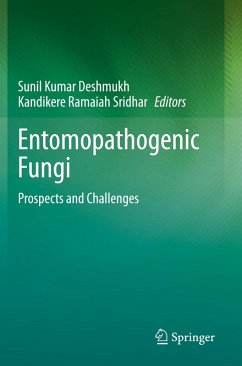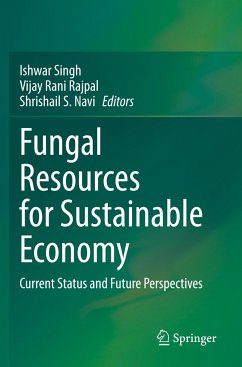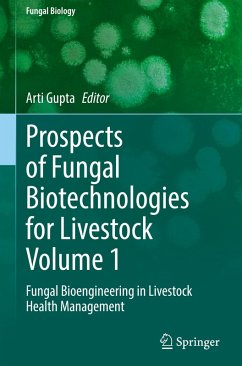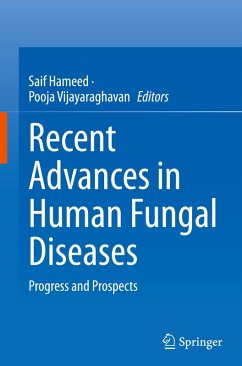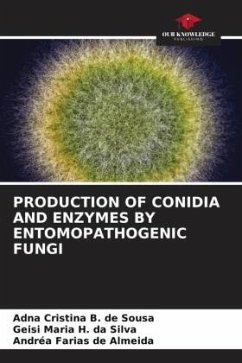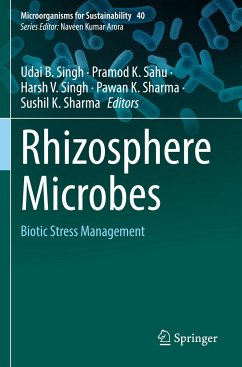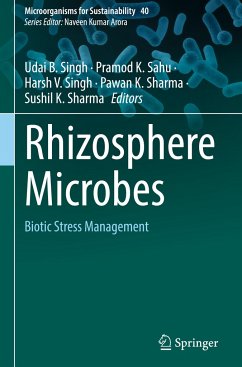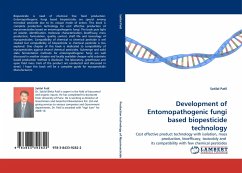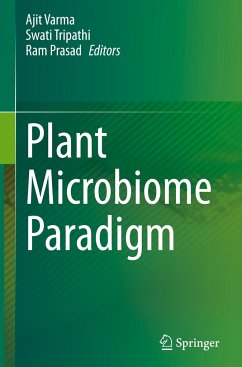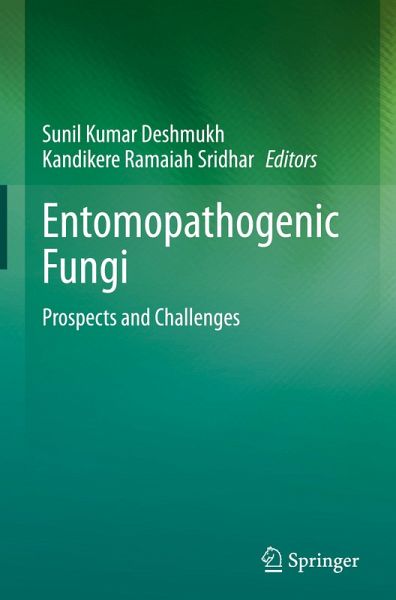
Entomopathogenic Fungi
Prospects and Challenges
Herausgegeben: Deshmukh, Sunil Kumar; Sridhar, Kandikere Ramaiah

PAYBACK Punkte
95 °P sammeln!
This book brings together the molecular aspects of the pathogenesis of entomopathogenic fungi, various aspects of mycoinsecticide development, and regulatory aspects to highlight the immense contribution of the agricultural sector. The chapters address aspects of entomopathogenic fungi, including host-pathogen interactions (susceptibility and resistance), fungus-insect and fungus-fungus dual interactions, phylogeny and taxonomy, biochemistry, and molecular basis of enteropathogenesis, market potential of entomopathogens, regulatory aspects, bioprospecting of fungi, fungi as crop bodyguards and...
This book brings together the molecular aspects of the pathogenesis of entomopathogenic fungi, various aspects of mycoinsecticide development, and regulatory aspects to highlight the immense contribution of the agricultural sector. The chapters address aspects of entomopathogenic fungi, including host-pathogen interactions (susceptibility and resistance), fungus-insect and fungus-fungus dual interactions, phylogeny and taxonomy, biochemistry, and molecular basis of enteropathogenesis, market potential of entomopathogens, regulatory aspects, bioprospecting of fungi, fungi as crop bodyguards and in disease suppression, and consortia for the control of insect pests and pathogens in single crop systems. Written by experts in academia and industry from Algeria, Brazil, Hungary, India, Italy, Malaysia, Oman, Pakistan, and the United States, the book overviews entomopathogenic fungi used as biological control agents against insect pests and other arthropods, their mode of action, pathogenesis, bioactive metabolites, mycotoxins involved, their mass production, limitations, and agricultural- and environment-related issues. It also includes developing various biopesticide products, with special references to formulations and prospects.
In agriculture, crop protection and production depend on insect pests controlled by entomopathogenic fungi. Understanding the pathogenicity, mechanism of action, formulations, and applications of a wide array of entomopathogenic fungi as biopesticides is a valid eco-friendly approach. The book provides advances in pathogenicity, biochemistry, virulence, and interaction that facilitate the application of Beauveria, Metarhizium, and other entomopathogens as potential biopesticides against major insect pests. Developments in bioactive compounds, secondary metabolites, enzymes, and toxins of entomopathogenic fungi have facilitated precise applications and management to target insect pests. Further advances in molecular aspects, the formulation of nanobiopesticides, and biofabricated technology paved the way for insect pest control. This book will be a helpful resource for students, teachers, researchers, scientists, and professionals in the industry working on biological sciences, applied entomology, mycology, zoology, forestry, biochemistry, molecular biology, and nanotechnology.
In agriculture, crop protection and production depend on insect pests controlled by entomopathogenic fungi. Understanding the pathogenicity, mechanism of action, formulations, and applications of a wide array of entomopathogenic fungi as biopesticides is a valid eco-friendly approach. The book provides advances in pathogenicity, biochemistry, virulence, and interaction that facilitate the application of Beauveria, Metarhizium, and other entomopathogens as potential biopesticides against major insect pests. Developments in bioactive compounds, secondary metabolites, enzymes, and toxins of entomopathogenic fungi have facilitated precise applications and management to target insect pests. Further advances in molecular aspects, the formulation of nanobiopesticides, and biofabricated technology paved the way for insect pest control. This book will be a helpful resource for students, teachers, researchers, scientists, and professionals in the industry working on biological sciences, applied entomology, mycology, zoology, forestry, biochemistry, molecular biology, and nanotechnology.



